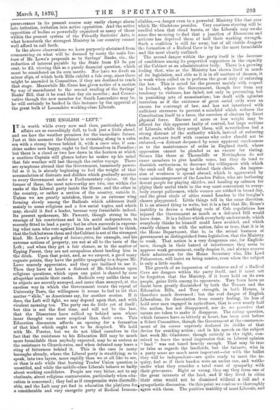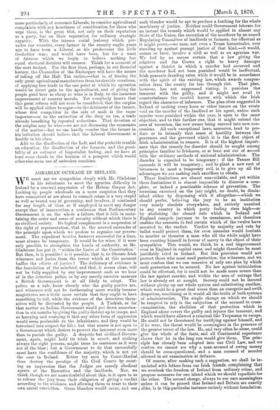THE ENGLISH "LEFT."
IT .is worth while every now and then, particularly when
affairs are so exceedingly dull, to look just a little ahead, and see how the weather promises for the immediate future. Just at this moment the Cabinet is steaming along in a calm sea with a strong breeze behind it, with a crew who, if sun- shine makes men happy, ought to feel themselves in Paradise ; but there is a cloud or two low down in the horizon at which a cautious Captain will glance before he makes up his mind that fair weather will last through the entire voyage. There are symptoms abroad that the Government, immensely power- ful as it is, is already beginning to feel the weight of that accumulation of distrusts and dislikes which gradually accretes to every Government under a Parliamentary regime. Of the former of these, the most noteworthy are two, one within the ranks of the Liberal party inside the House, and the other in the country, or rather a section of the country, outside it. Unless we are greatly mistaken, there is an extreme wing forming slowly among the Radicals which addresses itself mainly to some religious and a few social topics, and which may, should it find a leader, become very formidable indeed. Its present spokesman, Mr. Fawcett, though strong in the courage of his convictions and in his acrid independence, is scarcely fitted to lead a party; but he often succeeds in express- ing what men who vote against him are half inclined to think, that the link between them and the Cabinet is not of the strongest kind. Mr. Lowe's policy of laissez-faire, for example, and his extreme notions of property, are not at all to the taste of the Left ; and when they get a fair chance, as in the matter of Epping Forest, they are not scrupulous about landing him in the ditch. Upon that point, and, as we suspect, a good many cognate points, they have the public sympathy to a degree Mr. Lowe scarcely appreciates, and they are inclined to use it. Then they have at heart a distrust of Mr. Gladstone upon religious questions, which upon one point is shared by men altogether outside their ranks. Radicals very unlike them as to objects are secretly annoyed, and more than annoyed, at the careless way in which the Government treats the repeal of University Tests, the willingness it seems to feel to let that matter "slide," as Americans say, for another session. If it does, the Left will fight, we may depend upon that, and with virulent meaning too. The party can do little yet of itself ; but this is not the first time, and will not be the last, that the Dissenters have rallied up behind men whose inner thought was more sceptical than their own. This Education discussion affords an opening for a formation of that kind which ought not to be despised. We hold with Mr. Forster, but we do not blind ourselves to the fact that the resistance to his Education Bill may be much more formidable than anybody expected, may be as serious as the resistance to Church-rates, and when defeated may leave a sting of bitterness behind it. This is the case in many boroughs already, where the Liberal party is stratifying, so to speak, into two layers, more rapidly than we at all like to see, or than is safe while that burning Trades' Union question is unsettled, and while the middle-class Liberals behave so badly about working candidates. People are very bitter, not to say obstinate, shoat religious controversies, particularly when edu- cation is concerned ; they feel as if compromise were discredit- able, and the Left may yet find in education the platform for a considerable and very energetic party of Radical Irrecon-
cilables,—a danger even to a powerful Ministry like that over which Mr. Gladstone presides. Very cautious steering will be needful when that cloud bursts, or the Liberals may awake some fine morning to find that a junction of Dissenters and artizans has deprived them of half their working strength. Such a coalition is still far away, but of all visible dangers the formation of a Radical Cave is by far the most formidable and the most clearly outlined.
The second danger within the party itself is the decrease of confidence among its propertied supporters in the capacity of the Cabinet as an administrative body. There is a growing feeling that, wise as the Ministry has shown itself in much of its legislation, and able as it is in all matters of finance, it is weak when called on to perform the great duty of enforcing the law. This is noted for the present mainly with respect to Ireland, where the Government, though free from any tendency to violence, has failed, not only in preventing, but in punishing acts of assassination; has dealt with agrarian terrorism as if the existence of great social evils were an excuse for contempt of law, and has not interfered with sufficient sternness to prevent a mischief which reduces the Constitution itself to a farce, the coercion of electors by direct physical force. Excuses of more or less weight may be offered for this apparent laxity of control, but large sections of Liberals, while they accept them, will nevertheless feel a strong distrust of the authority which, instead of enforcing order, contents itself with reasons why order should not be enforced,—a distrust deepened by some apparent carelessness as to the maintenance of order in England itself, where oppression cannot be pleaded as an excuse for rioting. Scenes like those at Thorncliffe or Nottingham do not cause members to give hostile votes, but they do tend to diminish enthusiasm, to decrease the willingness with which the rank and file spring to defend their chiefs. An impres- sion of weakness is spread abroad, which is aggravated by some mismanagement of the London Police, who are bothering decent people for playing skittles, and hauling up cabmen for plying their useful trade in the way most convenient to every- body except policemen, while women are robbed in broad day, and the great circle of cities round London is the burglar's chosen playground. Little things tell in the same direction. It is an absurd thing to write, but it is a fact that Mr. Bruce's inability to devise a working code of Cab regulations has injured the Government as much as a defeated Bill would have done. It is a failure which everybody understands, which everybody thinks he himself could have avoided, and which exactly chimes in with the notion, false or true, that it is in the Home Department, that is, in the actual business of government as distinguished from legislation, that the Ministry is weak. That notion is a very dangerous one, for English- men, though in their hatred of interference they seem to approve weak government, really despise it, and always reserve their admiration for the Home Secretary who, like Lord Palmerston, will insist on being master, even when the subject is only a little smoke.
The growth of an impression of weakness and of a Radical Cave are dangers within the party itself, and it must not be forgotten that the Ministry, if it loses hold on its own people, gains little among its opponents. Tory fears have no doubt been greatly diminished by both the Tenure and the Education Bills, and Tory strength, in both Houses, is therefore much decreased ; but the real danger of English Liberalism, its dissociation from county feeling, its loss of hold over men engaged in agriculture, that is over nearly half the nation, has not disappeared, nor do we perceive that means are taken to make it disappear. The rating question, which farmers have so bitterly at heart, has been sent before a Select Committee, though the Government at the commence- ment of its career expressly declared its dislike of that device for avoiding action ; and in his speech on the subject last week Mr. Gladstone, though entirely in the right, con- trived to leave the usual impression that in Liberal opinion " land " was not taxed heavily enough. That may be true or false as regards the landlords, but the farmers, who in a party sense are much more important—for with the ballot they will be independent—are quite ready to meet the in- quiry, feel as if their burden were an undue one, and writhe under what they consider a total want of sympathy with their grievances. Right or wrong, they say they form one of the great interests of the land, and if they lived in cities
their cries would not be dismissed without a full and a sympathetic discussion. On this point we confess we thoroughly agree with them. The positive inability of most Liberals, and
more particularly of economic Liberals, to consider agricultural complaints with any heartiness of consideration for those who urge them, is the great blot, not only on their reputation as a party, but on their reputation for ordinary strategic capacity. With the intense social jealousy which per- vades our counties, every farmer in the country ought years ago to have been a Liberal, as his predecessor the little freeholder was ; and would have been, but for a want of fairness which we begin to believe nothing but equal electoral districts will remove. Think for a moment of the next budget. For the first time, perhaps, in our financial history, the Chancellor of the Exchequer will have the means of taking off the Malt Tax entire,—that is, of freeing the only great agricultural manufacture from intolerable vexations, of applying free trade to the one point at which its operation would be direct gain to the agriculturist, and of giving the people good beer as cheap as wine is in Italy, to the immense improvement of country morals. Yet everybody knows that this great reform will not even be considered, that the surplus will be applied either to sugar—to the detriment of the farmer, whose first competitor in the sale of malt is the sugar importer—or to the extinction of the duty on tea, a trade already benefiting by repeated reductions. That devotion of the surplus may be wise—we are not discussing the economics of the matter—but we can hardly wonder that the farmer in his irritation should believe that the Liberal Government is hostile to his class.
Add to the disaffection of the Left, and the probable trouble on education, the disaffection of the farmers, and the possi- bility of an outburst of Imperialist feeling, and we have at least some clouds in the horizon of a prospect which would otherwise seem one of unbroken sunshine.



































 Previous page
Previous page